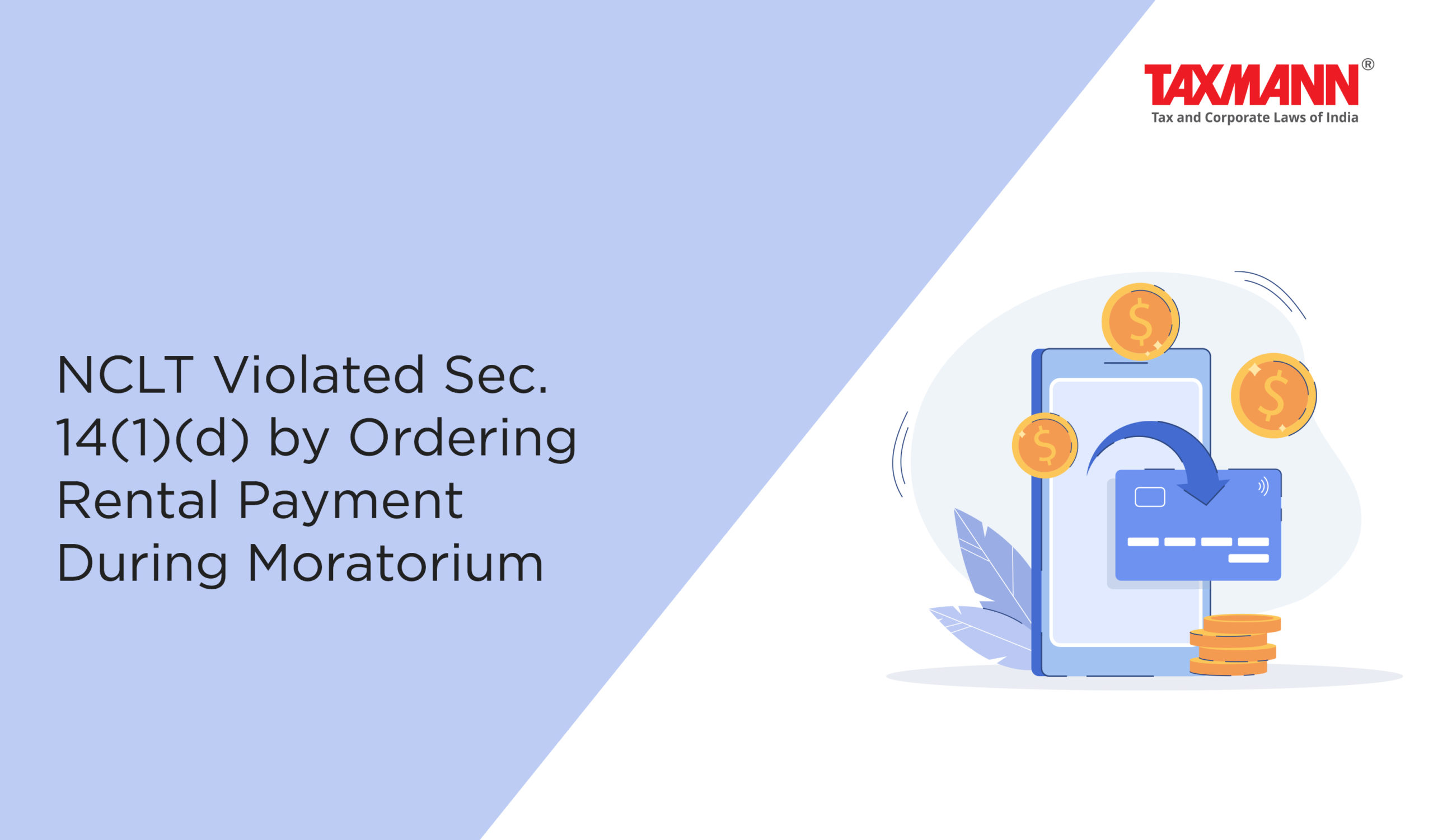NCLT Violated Sec. 14(1)(d) by Ordering Rental Payment During Moratorium
- News|Blog|Insolvency and Bankruptcy Code|
- 2 Min Read
- By Taxmann
- |
- Last Updated on 19 June, 2023

Case Details: Supriyo Kumar Chaudhuri, Liquidator of JVL Agro Industries Ltd. v. Jhunjhunwala Oil Mills Ltd. - [2023] 150 taxmann.com 447 (NCLAT-New Delhi)
Judiciary and Counsel Details
-
- Rakesh Kumar, Judicial Member & Dr Alok Srivastava, Technical Member
- Ms. Swati Dalmia, Palzer Moktan & Indranil Ghosh, Advs. for the Appellant.
- Gautam Singh, Adv. for the Respondent.
Facts of the Case
In the instant case, the respondent (JOML) filed an application before the Adjudicating Authority (NCLT) seeking directions for the appellant (i.e. liquidator) of the corporate debtor to pay the due rental amount along with an interest on premises owned by the respondent, which were used by the corporate debtor.
The appellant submitted that the corporate debtor had shifted its registered office to the said premises, which was purely an arrangement between two companies belonging to the same group of companies. Therefore, no rent agreement was signed between the parties. Further, there was no indication of any rent to be paid regarding the use of the said premises by the corporate debtor.
The NCLT by the impugned order held that the premises were being used by the corporate debtor and, directed the appellant to pay the outstanding rental amount within two months.
Thereafter, an appeal was made to the National Company Law Appellate Tribunal (NCLAT) against the order passed by the NCLT.
NCLAT Held
The NCLAT observed that the issue of the due rental amount was raised by the respondent only after the corporate debtor went into the CIRP. Further, the recovery of the said premises in possession of the corporate debtor owned by the respondent was expressly prohibited during the moratorium period under section 14(1)(d) of the IBC. Therefore, no rental amount was payable to the respondent by the corporate debtor during the period of the moratorium.
The NCLAT held that the NCLT had exceeded its jurisdiction by ordering payment of the outstanding rental amount by the corporate debtor during the period of the moratorium. Thus, the impugned order passed by the NCLT was erroneous and the same was to be set aside. Accordingly, the appeal was disposed of.
List of Cases Reviewed
-
- Sri Supriyo Kumar Chaudhuri (Liquidator of JVL AGRO Industries Ltd.) v. Jhun Jhunwala Oils Mills Ltd. [2023] 150 taxmann.com 446 (NCLT – All.) (para 32) reversed [See Annex].
- Rajendra K. Bhutta v. Maharashtra Housing and Area Development Authority [2020] 114 taxmann.com 655/160 SCL 95 (SC) (para 29)
- Tata Consultancy Services Ltd. v. Vishal Ghisulal Jain, Resolution Professional of SK Wheels (P.) Ltd. [2021] 132 taxmann.com 232/[2022] 170 SCL 153 (SC) (para 29) followed.
List of Cases Referred to
-
- Rajendra K. Bhutta v. Maharashtra Housing and Area Development Authority [2020] 114 taxmann.com 655/160 SCL 95 (SC) (para 10)
- Tata Consultancy Services Ltd. v. Vishal Ghisulal Jain, Resolution Professional of SK Wheels (P.) Ltd. [2021] 132 taxmann.com 232/[2022] 170 SCL 153 (SC) (para 10).
Disclaimer: The content/information published on the website is only for general information of the user and shall not be construed as legal advice. While the Taxmann has exercised reasonable efforts to ensure the veracity of information/content published, Taxmann shall be under no liability in any manner whatsoever for incorrect information, if any.

Taxmann Publications has a dedicated in-house Research & Editorial Team. This team consists of a team of Chartered Accountants, Company Secretaries, and Lawyers. This team works under the guidance and supervision of editor-in-chief Mr Rakesh Bhargava.
The Research and Editorial Team is responsible for developing reliable and accurate content for the readers. The team follows the six-sigma approach to achieve the benchmark of zero error in its publications and research platforms. The team ensures that the following publication guidelines are thoroughly followed while developing the content:
- The statutory material is obtained only from the authorized and reliable sources
- All the latest developments in the judicial and legislative fields are covered
- Prepare the analytical write-ups on current, controversial, and important issues to help the readers to understand the concept and its implications
- Every content published by Taxmann is complete, accurate and lucid
- All evidence-based statements are supported with proper reference to Section, Circular No., Notification No. or citations
- The golden rules of grammar, style and consistency are thoroughly followed
- Font and size that’s easy to read and remain consistent across all imprint and digital publications are applied



 CA | CS | CMA
CA | CS | CMA
